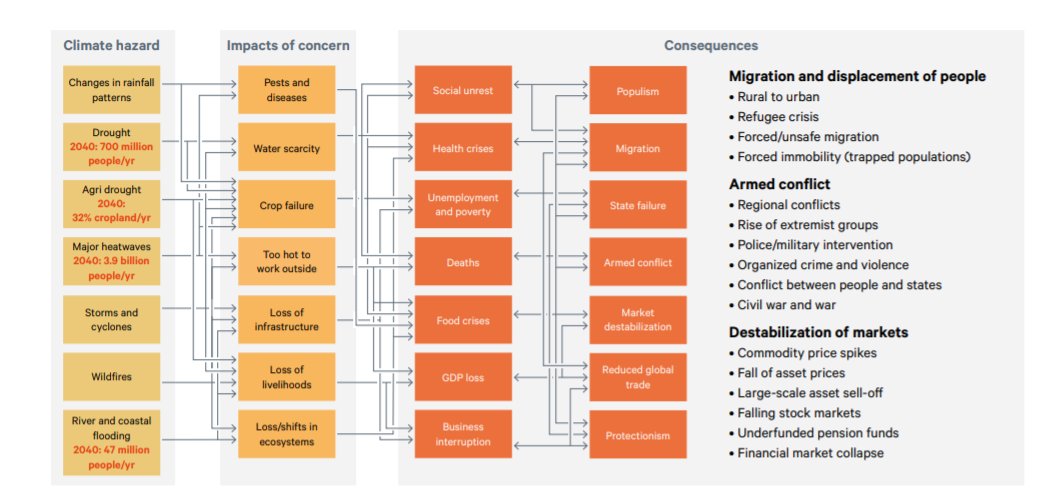A couple of weeks ago @ChathamHouse, The Royal Institute of International Affairs, published a crucial new ‘Climate change Risk Assessment’, which barely made the papers let alone the front pages.
But it REALLY should have done! Here’s why 🧵…
But it REALLY should have done! Here’s why 🧵…
https://twitter.com/ChathamHouse/status/14421571420526755861/n
As stated on the cover of the report we have now reached a stage in the #climatecrisis where:
“The risks are compounding, and without immediate action the impacts will be devastating” 2/n
“The risks are compounding, and without immediate action the impacts will be devastating” 2/n

The report highlights that failure to act means that “cascading climate impacts can be expected to cause higher mortality rates, drive political instability and greater national insecurity, and fuel regional & international conflict” 3/n 

.@ODNI_NIC say CC will “exacerbate risks to human &national security force states to make hard choices & trade-offs. The burdens will be unevenly distributed, heightening competition, contributing to instability, straining military readiness, &encouraging political movements” 4/n 

“Physical risk events from heatwaves, wildfires, floods & droughts are of particular concern b/c of their potential to impact food security, energy &water infrastructure, as well as lead to business defaults on a scale that the insurance industry would be unable to cope with” 5/n 

“direct climate risks will likely drive food insecurity & loss of livelihoods, resulting in displacement of people, &migration pressures… these pressures will likely lead to loss of life, human rights violations, increased pressures on public institutions & infrastructure…” 6/n 

“developed countries would likely introduce export bans and people would resort to large-scale hoarding. All this would likely result in a negative feedback loop, amplifying shortages and price increases.” 7/n 

Climate breakdown raises the terrifying prospect of simultaneous crop failures “The probability of a synchronous, greater than 10% crop failure across all of the top four maize producing countries is currently near zero, but this rises to around 6.1% each year in the 2040s” 8/n
This means “The probability of a synchronous crop failure of this order during the decade of the 2040s is just less than 50%” !!! 9/n 

“by the 2030s, the number of people on the planet exposed to heat stress exceeding the survivability threshold is likely to surpass 10 million a year” !!! 10/n 

“By 2040, 3.9 billion people are likely to experience major heatwaves, 12 times more than the historic average.” !!! 11/n 

"...increased urban heat islands, combined with reduced water for cooling within thermal power stations, will likely lead to heightened demand &supply shortages... leading to black- and brownouts and ultimately a lack of cooling services, & thus heat stress & mortality" 12/n 

The cascading risk most concerning experts: "interconnections between shifting weather patterns, resulting in changes to ecosystems, &the rise of pests &diseases, which combined with heatwaves &drought will likely drive unprecedented crop failure, food insecurity &migration" 13/n
Perhaps most concerning of all is that “If policy ambition, low-carbon technology deployment & investment follow current trends, 2.7°C of warming by the end of this century is likely, relative to pre-industrial temps. A plausible worst case of 3.5°C is possible (10% chance)” 14/n 

“If emissions follow the trajectory set by current NDCs, there is a less than 5 per cent chance of keeping temperatures well below 2°C relative to pre-industrial levels, and less than 1 per cent chance of reaching the 1.5°C Paris Agreement target.” 15/n
I urge you to read this report yourself & to share it as widely as possible, particularly with political representatives, management teams at your place of work etc.
You can find the full report here:
chathamhouse.org/sites/default/…
& a short summary here:
chathamhouse.org/sites/default/… /end
You can find the full report here:
chathamhouse.org/sites/default/…
& a short summary here:
chathamhouse.org/sites/default/… /end
• • •
Missing some Tweet in this thread? You can try to
force a refresh





















